[ad_1]
When Liverpool began their new era under Arne Slot, it was widely reported that centre-back and defensive midfield were the club’s transfer priorities along with a new wide forward.
The transfer window is now set to close with only two new signings – one, in Giorgi Mamardashvili, a goalkeeper who won’t join the squad until next summer at the earliest.
Federico Chiesa‘s initial £10 million switch from Juventus ticks the box in terms of a wide forward, but deadline day will pass without Liverpool having addressed their two glaring vacancies.
After a major overhaul in the wake of Jurgen Klopp‘s resignation, which has included a mass restructure of both Liverpool and Fenway Sports Group’s setup off the pitch, it looks to have been a summer where time simply ran out.
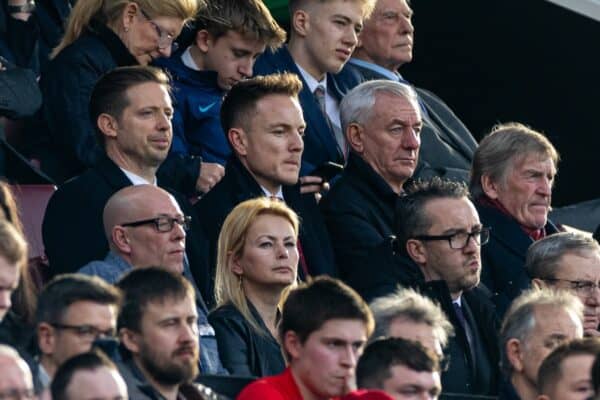

That can largely be attributed to the changes in the dugout and in the boardroom, with Arne Slot eager to run the rule over the squad he inherited before sporting director Richard Hughes, in tandem with FSG’s new CEO of football Michael Edwards, got to business.
Decisions that would have been made in meetings between Klopp and the club’s recruitment staff – once led by Edwards as sporting director – months in advance were pushed back until after the transfer window itself had opened.
It meant deals to send out-of-favour right-back Calvin Ramsay to Wigan on loan and out-of-sight defender Anderson Arroyo to Burgos for an undisclosed fee were the only transfers of any sort in the first six weeks of the window.
The Zubimendi ‘saga’
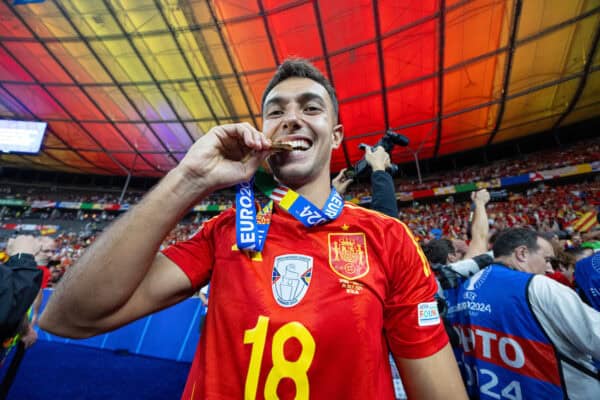

Even after that, there was no real concrete movement in or out until August, when Real Sociedad midfielder Martin Zubimendi emerged as Liverpool’s chosen target for the No. 6 role.
A problem area for years, Zubimendi was identified as the solution at the base of Slot’s new-look midfield, with all involved convinced he had the skillset required.
But though Hughes believed the Euro 2024 had given his word that he intended to join the Reds in a deal which would have been worth £51 million, the transfer ultimately fell through when the midfielder had a change of heart.
That was hardly the fault of Liverpool’s decision-makers, though the allegiances of a player who had already turned down moves to Barcelona, Bayern Munich and Arsenal should perhaps have been taken with more caution.
Supporters quickly moved on; if Zubimendi had the fortitude to turn down a move to Anfield, he wasn’t the right target in the first place.
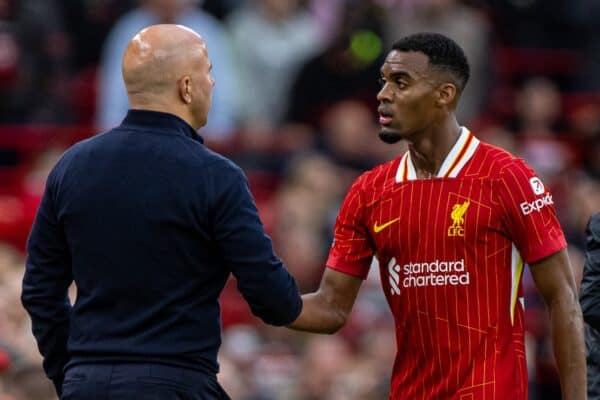

The resolve to not pursue an alternative, however, proved less popular, despite the promising first shoots of form shown by Slot’s chosen in-house No. 6, Ryan Gravenberch.
Liverpool are claimed to hold the belief that there are few players in world football capable of improving on the squad already at the head coach’s disposal.
But with Wataru Endo quickly dismissed as a starting option after less than 90 minutes in pre-season – with the club open to offers after rejecting an initial £11.8 million bid from Marseille – it was clear that defensive midfield was an area Slot felt needed strengthening.
The likes of Porto’s Alan Varela, Atalanta’s Ederson and Sporting CP’s Morten Hjulmand were held up as feasible alternatives, and all three would likely have enhanced the squad as regular starters.
Liverpool’s hierarchy held firm, though, with Endo perhaps seen as an example of a mistake the previous regime made in pursuing stopgap alternatives.
One such player would of course have been Manuel Ugarte, who has swapped Paris Saint-Germain for Man United in a deal worth £50.8 million to the envy of certain supporters, but will quickly show he does not possess the all-round acumen required from Slot’s No. 6.
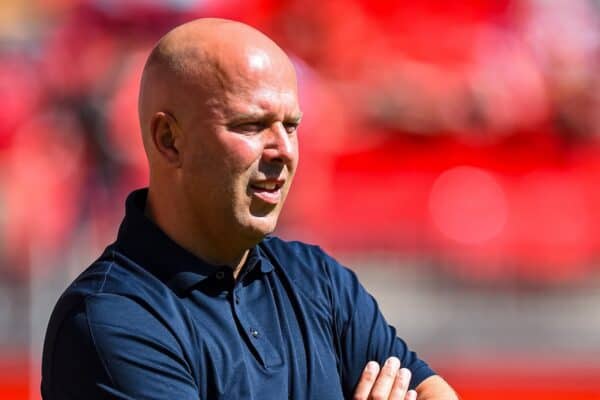

Still, the sense that it was Zubimendi or nothing paints the summer market as thinner than should be expected for a club of Liverpool’s financial resources.
It was a window, after all, that saw Joao Neves join PSG for up to £60 million and Amadou Onana swap Everton for Aston Villa for £50 million, while Newcastle‘s Bruno Guimaraes was ostensibly available due to their PSR issues.
Was there a lack of ambition, or more aptly urgency, from a setup still finding their feet in offices on Merseyside and across the Atlantic at FSG’s base in Boston?
Though Slot will admirably hold faith Gravenberch – and the Dutchman will hopefully continue to repay that – that he has been left to push on with the undesired Endo as his alternative suggests that may have been the case.
Big sales like the Edwards era
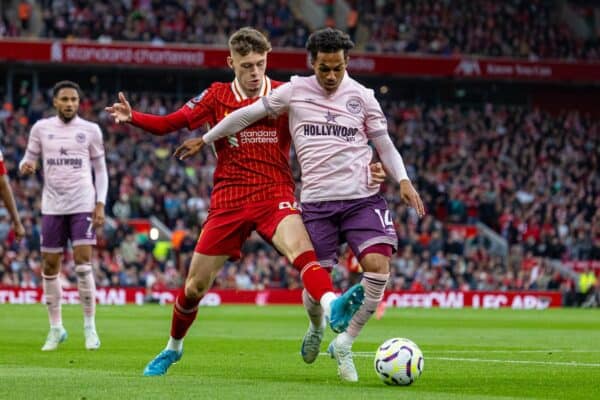

There were other times, however, when Liverpool’s approach to the window could be seen as more of masterful patience, such as in securing big-money deals for fringe talents.
Fabio Carvalho was sold to Brentford for £27.5 million having seen an earlier bid of £15 million rejected; and Sepp van den Berg also joined the Bees for £25 million after himself claiming a £20 million price tag was “majorly high.”
Bobby Clark‘s desire to join Pepijn Lijnders at Red Bull Salzburg led to three bids being turned down before a £10 million package was agreed – including, as with Carvalho and Van den Berg, a 17.5 percent sell-on clause.
The same stance saw the club hold onto Caoimhin Kelleher and Joe Gomez despite the pair considering moves away, while it almost landed Anthony Gordon for a bargain fee after Newcastle agreed to pay £45 million for Gomez early in the sumer.
The deals for Carvalho, Van den Berg and Clark displayed Hughes’ acumen and certainly garnered favour from fans after criticism of his lack of activity earlier in the summer.
Loans for the likes of Stefan Bajcetic (Salzburg), Ben Doak (Middlesbrough), Lewis Koumas (Stoke), Kaide Gordon (Norwich) and Calum Scanlon (Millwall) also showed the club’s pathways team at its best, aided by the return of David Woodfine as assistant sporting director.
Are Liverpool still lacking?
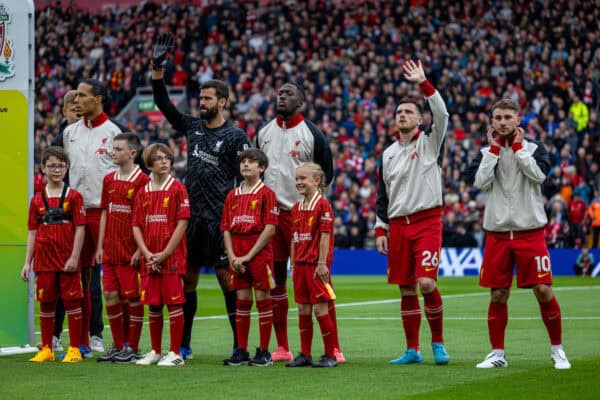

Given those positives – including the delayed deal for Mamardashvili, who is slated to arrive as competition for Alisson next summer – it is fair to say Liverpool’s transfer window would be considered a success under different circumstances.
Slot and his players will remain optimistic either way, and not without reason given the speed with which the Dutchman has implemented his new style of play and the addition of Chiesa as a new wildcard option to bolster the attack.
But without a new left-sided centre-back and, most importantly, starting No. 6, deadline day passes with a sense of opportunity lost for Liverpool when they could have laid a marker at the start of a new era.
On top of that remains the uncertainty over contracts for Trent Alexander-Arnold, Virgil van Dijk and Mohamed Salah – another hangover from the old regime.
The hope will be that it is simply the first step after a bold regime change and the pieces will eventually fall into place in terms of transfers, but all involved in modern football know it is a game that waits for no one.
[ad_2]











